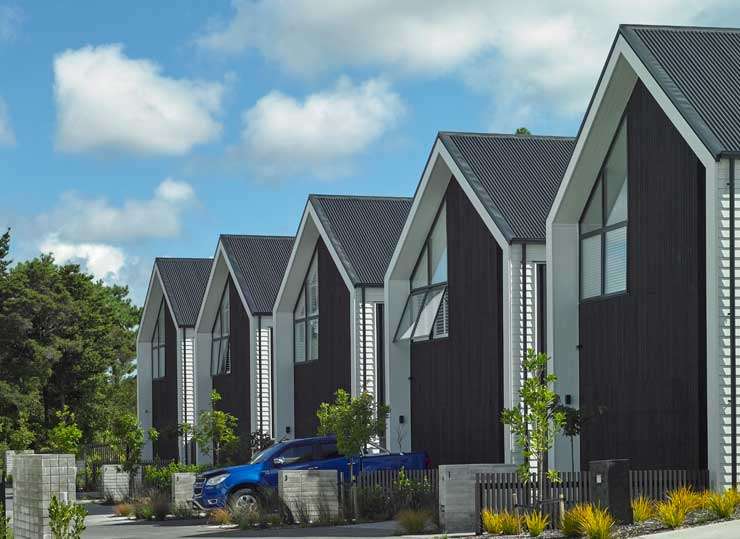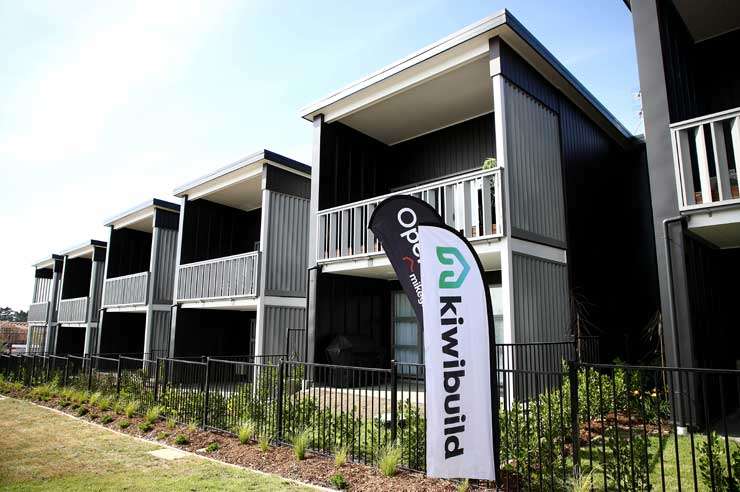In a hot market, buying off-the-plan can often save first home buyers thousands of dollars and hours in repeated due diligence and legal advice ahead of missing out at auction after auction. But while there are benefits, there are also drawbacks.
John Bolton, founder of Squirrel Mortgages, says part of the appeal of off-the-plan homes is that they are sold at a fixed price. And that that price, in many cases, is discounted.
READ MORE: Find out if your suburb is rising or falling
“The developers are motivated to get them sold so they can start building and because there’s no physical product to wander around and get emotionally attached to it’s a harder sales process so they do tend to sell at a little bit of a discount compared to what they’re worth at the end,” Bolton says.
Start your property search
Often, the property has already made money by the time it is completed, but that’s not always the case.
Sometimes the market drops, and you are caught on the other side of having something that’s worth less than the sale price, he says. “But if the market’s steady, you would expect to get an incremental step up in value simply through the build process.”
You might also get into a better location than if you were buying a traditional house, he says, because an off-the-plan townhouse might be in a neat urban environment rather than the outskirts of the city.
“There’s quite a bit of stuff at Hobsonville Point; there are terraced townhouses going into Takapuna at the moment and there is a heap of them going into places like Mt Albert.”

The master-planned community in Auckland's Hobsonville Point has proved popular with first home buyers over the years. Photo / Getty Images
And while terrace houses are compact, a growing number of people are beginning to realise they don’t need a large backyard. A modern, sometimes architecturally designed, townhouse with a café at the end of the road and a park across the road can be just as good as a quarter acre section.
If you want that, a good place to start looking is in a master planned community, and there are a lot of those around in Auckland now.
Bolton says the build process can take 18 months to two years, though some may be faster - but the wait can have benefits, too. “If you’re buying in a rising market, then you’re buying at today’s price but you won’t have to settle for a year,” he says.
A fixed price means buyers don’t need to battle it out in an auction room competing with others, he says.
A deposit is paid up front, usually 10%, and most people can access KiwiSaver for this, plus still keep saving ahead of the eventual settlement.
Bolton also says most KiwiBuild homes are sold off-the-plan and they are an amazing opportunity for people because the fixed three-bedroom price of $650,000 might buy you an $800,000 value property in Auckland.
“You’ve got to go into a ballot system because they’re so popular and no wonder, because there’s so much equity in them.”

The deposit for an off-the-plan house can be as low as 10%. Photo / Getty Images
Bolton advises off-the-plan buyers to do their due diligence and research other developments by the same developer. “That way you can see if you like it. It does take a little bit more effort to figure out what it’s going to be like to live in a property when you’re just looking at some pictures,” he says.
Getting finance is harder than for buying an existing property with most banks not giving approval all the way to settlement, he says, but people can get approval up front then keep applying to extend the approval, or reapply three or four months before the home is due to complete.
People’s circumstances can change, such as losing a job, so there is risk if that happens but Bolton says that risk is also there if you already own a house and lose your job – and you can always on-sell if you need to.
And with deposits held in a solicitor’s trust if, for example, the developer doesn’t complete, the money is returned.

Covid-19 has impacted construction and delivery schedules. Photo / Getty Images
Watch out for different clauses in the contracts, however. A typical one allows developers to pull out if they don’t get enough pre-sales or get their resource consents and while there is often a sunset clause where the buyer, too, can cancel if the developer goes past a certain date, that also works for the developer who can cancel if they don’t finish in time.
“There have been situations in the past where developers haven’t finished projects but the development has gone up in value and the developer has cancelled the agreements then re-sold them so there’s always that risk.”
The best off-the-plan developments are those where the consents have already been issued and there’s a confirmed start date. Bolton says that ones that don’t have consents in place are more likely to drift. “You want a reputable builder; you want people with a bit of a balance sheet who can finish things they start,” he says.
The biggest issue with these new developments of late are delays from Covid-related delivery issues. “I haven’t seen a project delivered on time yet. Most of them seem to be probably about six months behind schedule,” Bolton says.
Joanna Pidgeon, of Pidgeon Law in Auckland, says buyers considering off-the-plan homes should get a lawyer who knows the process and what to look out for in contracts. “You do need someone who knows the pitfalls. We’ll often negotiate tweaks to the agreement for a purchaser during the due diligence phase,” she says.
Pidgeon points out that if the development doesn’t go ahead buyers are back where they started while the rest of the market may have moved upwards. “If you’d signed up a year ago and you’re back in the market, the market’s moved 10, 20 per cent,” she says.
She advises getting loans pre-approved before signing a contract even though settlement may be a long way off. “Don’t leave getting finance for two years’ time. Get it approved for now and then you have the confidence of knowing you currently meet criteria. The other issue is that banks can change their loan ratio rules, particularly if you’re an investor rather than a homeowner, so being aware that might happen is quite important, too.”

